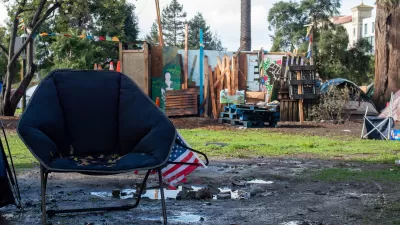Opponents to a new university housing project cited a recent Berkeley case in which noise pollution was successfully used to deny an exemption from environmental review.

An appellate court in Southern California used a legal precedent set in Berkeley to deny a request for an exemption from environmental review for a proposed housing project near the University of Southern California in downtown Los Angeles, reports Matt Brown in The Daily Californian. The new ruling “is focused on a proposed rooftop deck, which appellants worry will generate too much noise.” In Berkeley, opponents of a new student housing development relied on potential noise to gain a legal victory over the university in a contentious battle, forcing the university to deny admissions to thousands of potential students.
The city of Los Angeles originally granted the exemption for the infill project, which is proposed for a 2.8-acre lot less than a mile from the USC campus housing a building previously used by the university as offices. “The city intended to demolish the existing site and parking lot to make way for a seven-building residential apartment complex. Six of the buildings were planned to be four stories with a combined 100 five-bedroom apartments and two three-bedroom apartments, and the seventh building was planned to be a four-story clubhouse with a variety of amenities for residents.”
More on the Berkeley story:
- Lessons From People’s Park
- UC Berkeley Commits to Supportive Housing Project in People's Park
- A Fight For the Future of People's Park
Correction: This article originally indicated that the project is a USC housing project and that lot in question is owned by the university. This is incorrect—USC previously used a building on the lot as offices, but is not involved with the proposed housing project.
FULL STORY: Noise pollution precedent set by People’s Park case blocks housing in LA

Alabama: Trump Terminates Settlements for Black Communities Harmed By Raw Sewage
Trump deemed the landmark civil rights agreement “illegal DEI and environmental justice policy.”

Planetizen Federal Action Tracker
A weekly monitor of how Trump’s orders and actions are impacting planners and planning in America.

Why Should We Subsidize Public Transportation?
Many public transit agencies face financial stress due to rising costs, declining fare revenue, and declining subsidies. Transit advocates must provide a strong business case for increasing public transit funding.

Understanding Road Diets
An explainer from Momentum highlights the advantages of reducing vehicle lanes in favor of more bike, transit, and pedestrian infrastructure.

New California Law Regulates Warehouse Pollution
A new law tightens building and emissions regulations for large distribution warehouses to mitigate air pollution and traffic in surrounding communities.

Phoenix Announces Opening Date for Light Rail Extension
The South Central extension will connect South Phoenix to downtown and other major hubs starting on June 7.
Urban Design for Planners 1: Software Tools
This six-course series explores essential urban design concepts using open source software and equips planners with the tools they need to participate fully in the urban design process.
Planning for Universal Design
Learn the tools for implementing Universal Design in planning regulations.
Caltrans
Smith Gee Studio
Institute for Housing and Urban Development Studies (IHS)
City of Grandview
Harvard GSD Executive Education
Toledo-Lucas County Plan Commissions
Salt Lake City
NYU Wagner Graduate School of Public Service





























